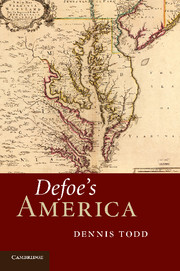Book contents
Conclusion: Defoe, cannibals, and colonialism
Published online by Cambridge University Press: 02 December 2010
Summary
In Robinson Crusoe, Colonel Jack, and Moll Flanders, the punishment of transportation and indentured servitude is construed as merciful because servitude offers an opportunity for moral reformation and material achievement. This is in keeping with the official public mythology that surrounded transportation: a felon petitioned for mercy of his own free will (supporters claimed), the king graciously responded to the felon's admission of his guilt by granting a pardon, and the felon acknowledged the king's paternal care with gratitude. This myth had little foundation in fact. Convicted felons asked for mercy whether they were guilty or not; justices drew up lists of those whose sentences they recommended for commutation, usually not giving the reasons why they deserved mercy; and the king signed the lists without review. There is no record of a single case where the recommendation of mercy was refused. From beginning to end, the whole bureaucratic process was “purely formal.”
The felon's plea for mercy was hardly a choice that was made freely. Although Jack's master says that transportation for criminals was a “Favour they had receiv'd … granted them on their own Request and humble Petition” (CJ, p. 121), that legal fiction was so threadbare that Defoe could not help but express his skepticism elsewhere. Moll emphasizes the reality of coercion that lies beneath the fiction of a voluntary “Request.”
- Type
- Chapter
- Information
- Defoe's America , pp. 158 - 179Publisher: Cambridge University PressPrint publication year: 2010

